Black Roots 1970 Nobody Knows You When Youre Down and Out
The forgotten political roots of Span over Troubled H2o
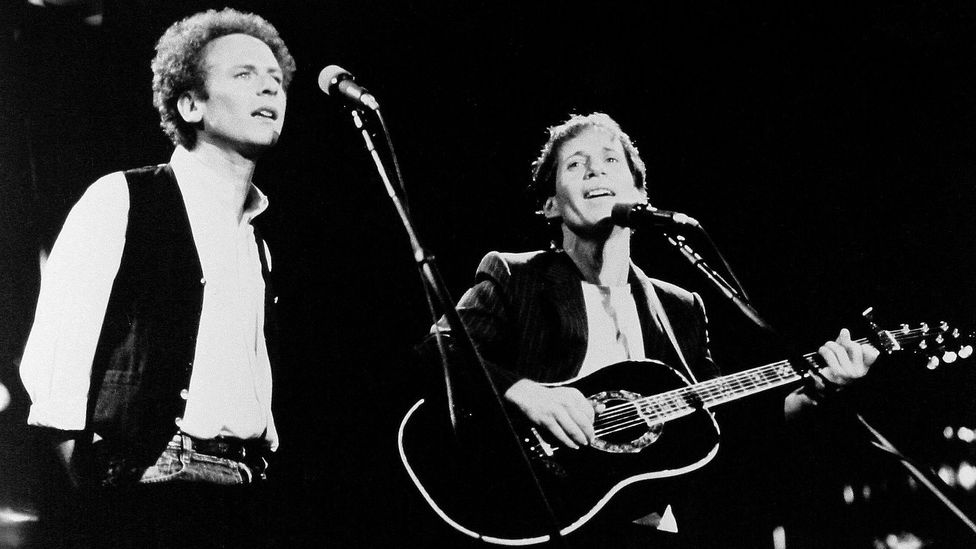
Fifty years old this month, Simon and Garfunkel's soaring anthem became i of the defining songs of the 1970s and beyond. But its saccharine reputation belies its protestation-song origins, writes Dorian Lynskey.
O
On the evening of 30 November 1969, the silver-haired player Robert Ryan introduced CBS viewers in the US to a buzzkill of historic proportions: Simon and Garfunkel's beginning ever TV special. "These two immature men have attracted a tremendous following amid the youth of America with their lyrical interpretation of the world we live in," said Ryan, who was a genuine fan. "We think you lot will find the next hour both entertaining and stimulating."
More like this:
- Why Pet Shop Boys are the cleverest men in pop
- Who was the real Freddie Mercury?
- Motown: The music that changed America
Paul Simon and Art Garfunkel certainly hoped so. According to executive producer Robert Drew, Simon talked virtually using the primetime opportunity as a Trojan horse for "a domicile movie about where he thought the nation was". Directed by histrion Charles Grodin, Songs of America used the duo'due south hits to soundtrack footage of riots, marches and the war in Vietnam, much to the horror of sponsors AT&T, who demanded their $600,000 investment back. Even more sympathetic viewers establish the movie's hostage sermonising difficult to swallow.
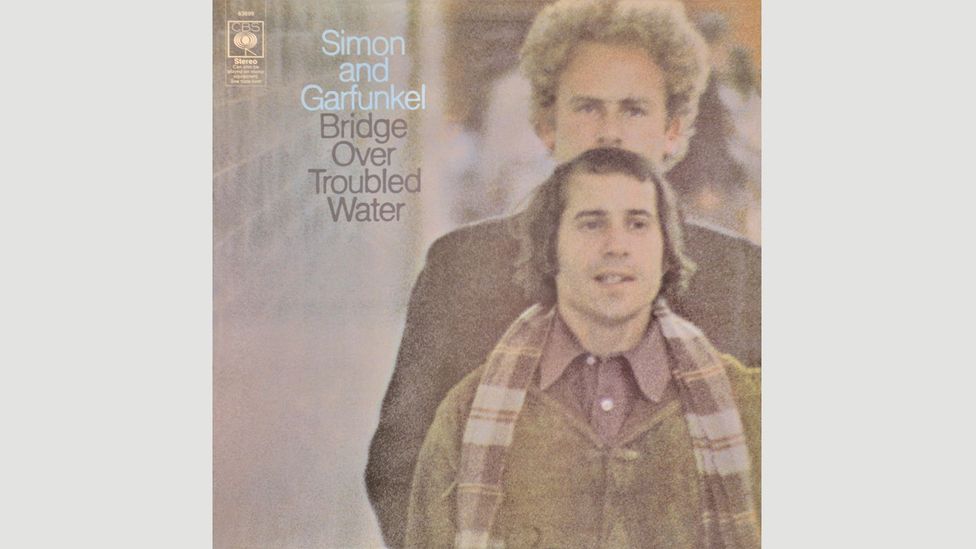
The album Bridge Over Troubled Water spent 35 weeks at the height of the UK charts over an eighteen-month menstruation (Credit: Alamy)
We commencement meet Simon and Garfunkel in the back of a motorcar. Coming off the back of four hit albums and two number one singles in four years, the 27-year-old superstars are non overburdened with humility. When Garfunkel brings upwards the subject field of America'due south imminent bicentennial, a photographic camera-conscious Simon gazes into the distance and asks solemnly: "Retrieve it's gonna make it?" This mood of pensive pomposity comes to boss the picture, as Simon frets: "What'due south the bespeak of this album? The world is crumbling", and Garfunkel less coherently ponders "the chaos of what the hell is the whole thing about".
They did take a point. Songs of America was screened on the eve of the country's showtime draft lottery since World War Two, amongst the years of the My Lai massacre, the Manson murders, the Days of Rage demonstrations in Chicago and the anti-Vietnam State of war March Against Death in Washington DC. Merely the average CBS viewer didn't want to see the world crumbling. The heaviest sequence was a night twist on the film'due south travelogue theme, juxtaposing clips of the Kennedys and Martin Luther King on the entrada trail with footage of mourners watching Bobby Kennedy's funeral train go by. The musical accompaniment was unfamiliar: a kind of white gospel song, stately and hymn-similar, building to a shattering climax as the long black railroad train sped through America's broken heart. One million viewers responded past turning the dial and watching the figure skating on NBC instead. Some sent hate mail. Songs of America wouldn't be seen once again for over 40 years. This was the US public's inauspicious introduction to what would go one of the defining songs of the 1970s and beyond: Bridge Over Troubled Water.
'My greatest song'
While writing songs for the duo's fifth anthology in the jump of 1969, Simon had borrowed an sometime Swan Silvertones album from the musician Al Kooper. Listening to the gospel grouping'southward version of the 19th-Century spiritual Oh Mary Don't You Weep over and again in his Upper East Side apartment, Simon was thunderstruck by a line improvised by lead singer Claude Jeter: "I'll be your span over deep water if you lot trust in my proper noun." Simon grabbed his guitar, sketched out some gospel chords, and began writing his own song around that paradigm. (2 years after, he was introduced to Jeter and wrote him a cheque on the spot.) Actually, it didn't feel like he was actively writing it, more than that it was flowing through him. Something about the sturdy grace of the melody and the Biblical annals of "I volition lay me downward" fabricated it seem equally if the song had been around forever.
"I have no idea where information technology came from," he recalled in the 2011 documentary The Harmony Game. "It merely came, of a sudden… I retrieve thinking, this is considerably better than I unremarkably write." He told people he worked with that he had written "my greatest song" and, referencing The Beatles' classic, "my Yesterday".
Paul Simon later called Bridge Over Troubled Water his "greatest vocal" (Credit: Getty Images)
The melody and lyrics weren't quite right withal but Simon knew that Bridge Over Troubled Waters (as it was then called) was "exceptional" even as he wondered if the words were "too simple". On songs such as The Sound of Silence, Mrs Robinson and America, he used characters, narratives and vividly precise imagery to map national unease onto personal feet. The uncharacteristically timeless, universal linguistic communication of Span Over Troubled Water actually does seem to hail from somewhere else. The celebrated New Orleans musician Allen Toussaint liked to say: "That song had two writers: Paul Simon and God." Fortunately, God wasn't registered with the American Society of Composers, Authors and Publishers.
The opening line about feeling weary and small was personal. While Simon was in New York writing songs, Garfunkel was off in United mexican states actualization in Mike Nichols' movie Catch-22 with his new Hollywood friends, including Charles Grodin. Simon felt abandoned, taken for granted. He was therefore feeling hypersensitive when Garfunkel finally reconnected with him in Los Angeles in June and heard the demo. Paul thought that simply Artie's choirboy vocalisation could do justice to the vocal but Artie liked the sound of Paul's falsetto and hesitated before like-minded to front the song. Garfunkel meant information technology as a compliment; Simon took it as a snub. Such was the state of their partnership in 1969. When Robert Drew beginning sat downwardly with the duo he came away thinking that the picture show would exist "Simon and Garfunkel'southward last stand".
Recording the vocal began in August 1969 in Hollywood, where producer Roy Halee gathered the elite session musicians known as the Hollywood Golden Trio: drummer Hal Blaine, bassist Joe Osborn and keyboardist Larry Knechtel. It was Knechtel's challenging job to translate the music from guitar to pianoforte according to Simon's paradoxical brief: "Paul wanted it to be gospel simply non gospel," he recalled. Simon imagined that Span Over Troubled H2o would be a "little hymn" just Garfunkel and Halee insisted that the song needed to exist immense. Information technology therefore needed a third poetry, which Simon dashed off in the studio. Information technology opened with a bulletin to his married woman-to-be Peggy Harper, who had recently fretted about finding her first grey hairs: "Sail on, silver daughter."
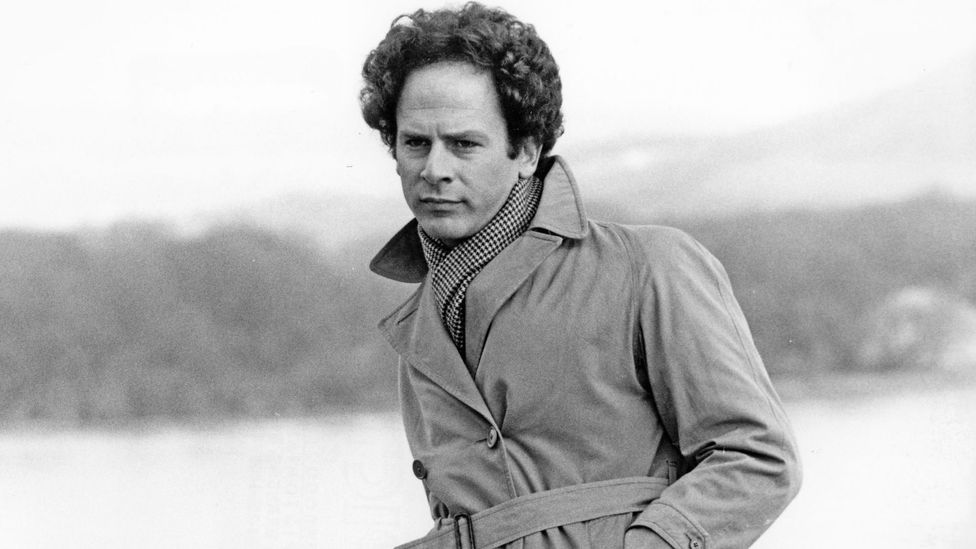
Art Garfunkel and producer Roy Halee insisted the song needed to exist immense, starting quietly and building to a transcendent finale (Credit: Alamy)
Garfunkel wanted the song to kickoff quietly and gradually build to a transcendent finale in the vein of Phil Spector's work with The Righteous Brothers — "like an airplane taking off". Simon wasn't certain about the bombastic strings (nor the fact that arranger Ernie Freeman had paid and so trivial attending to the lyrics that the sail music was titled Like a Pitcher of Water) but he had to admit that information technology sounded undeniable. Once the music was wrapped, Garfunkel recorded his showstopping song in New York in November. Simon, at Garfunkel's insistence, wasn't in the room.
Several songs from the Bridge Over Troubled H2o album were debuted on a short bout that autumn and Bridge Over Troubled Water left audiences incoherent. It may feel overfamiliar now merely imagine being in the crowd i dark in November 1969, hearing Garfunkel say: "This is as well one of our new songs. It's chosen Bridge Over Troubled Water," and and then hearing that for the first time. And imagine being Paul Simon, waiting in the wings with a cigarette while the other guy got all the applause for his vocal. That shouldn't have bugged him – it was his thought – but it did. "He felt like I should accept washed it," Simon grumbled to Rolling Stone magazine four bitter years later. "And many times I'thou sorry I didn't do it."
An instant classic
Despite the vocal'due south warm reception, Simon and Garfunkel had captivated the industry wisdom that long, stately ballads weren't radio-friendly and proposed the jaunty Cecilia as the album's taster unmarried. Simply after the first album playback, Columbia Records president Clive Davis was adamant that this was no ordinary ballad. "I felt Cecilia would be a hit simply Span was something more," he told Simon's biographer Robert Hilburn. "It was a landmark record."
Davis was correct. The song's deadening-burning arc became a virtue. Most hits fabricated sense in snatches, overheard from a passing car radio, but Bridge Over Troubled Water held the listener spellbound: you had to hear the whole thing or else you lot'd miss the payoff. Released on 20 January 1970, it held the tiptop spot for half-dozen weeks in the Us and three in the UK. Hard on the single'southward heels, the album was a goliath: 10 weeks at number one; 6 Grammy awards; 25 one thousand thousand sales worldwide. In the U.k., it occupied the height of the charts for an amazing 35 weeks over an xviii-month catamenia. It just kept coming dorsum.
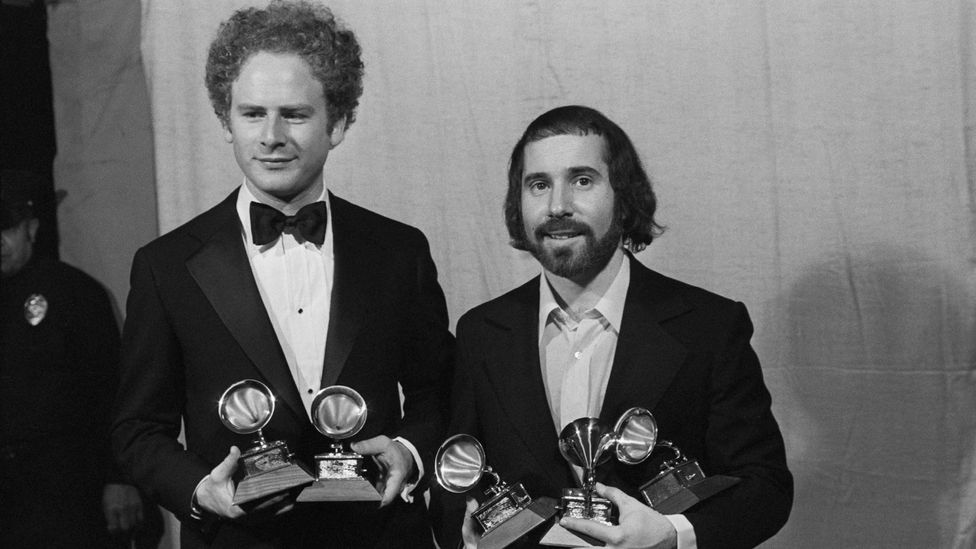
In 1970 Simon and Garfunkel won multiple Grammys for the album and the song (Credit: Getty Images)
Ironically, this song about unbending loyalty and solidarity coincided with the disintegration of a friendship that stretched back to 6th grade. Robert Drew wasn't exactly incorrect nigh Simon and Garfunkel's last stand, just a little premature. "Nosotros didn't really fight until Bridge Over Troubled Water," Simon said years later. "That had a lot to practise with Artie making a picture show at the same fourth dimension."
Their fraying partnership could survive i movie but not 2. After the album came out, Artie confessed that he had committed to co-starring in some other Mike Nichols moving-picture show, Carnal Knowledge. Paul felt betrayed; Artie felt held back. According to Simon, "something was cleaved betwixt us", and information technology couldn't be stock-still. On eighteen July 1970, at New York'due south Forest Hills tennis stadium, they closed the final appointment of the Bridge Over Troubled Water tour and, without telling anyone, went their separate means.
Meanwhile, the song proceeded without them, condign an instant standard that would yield hundreds of comprehend versions. Past the terminate of the year information technology had already been performed by Elvis Presley, Peggy Lee, Merry Clayton, the Jackson 5 and The Supremes. In 1971 Aretha Franklin took the vocal to church building, confirming Bridge Over Troubled H2o's status every bit a secular gospel vocal. In Oh Mary Don't You Weep, the voice promising to be a bridge is manifestly God. In Simon's vocal, information technology's a friend or lover, extending an encouraging hand, but the emotional forcefulness is similar. The singer will comfort y'all, dry your eyes, ease your mind, take your side.
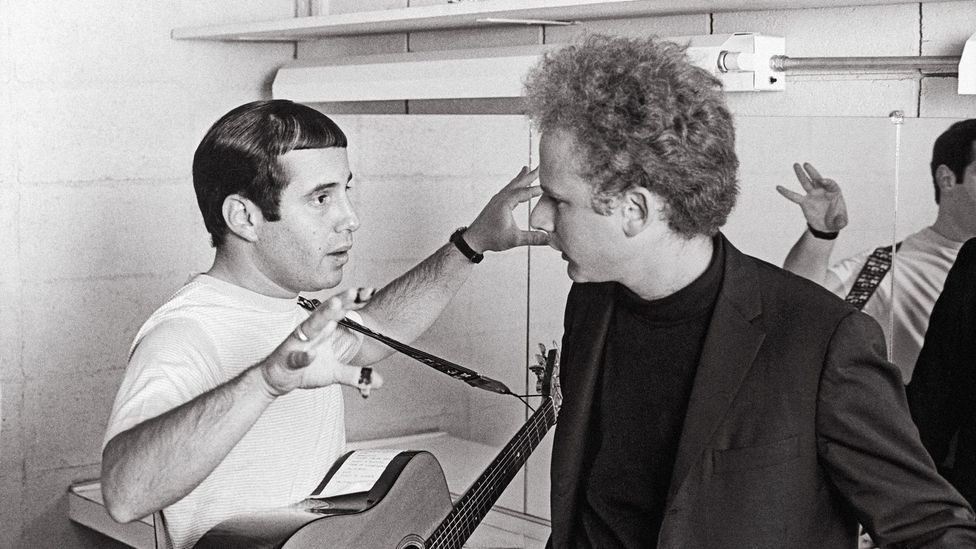
Simon and Garfunkel parted ways afterwards they played the last appointment of their Bridge Over Troubled Water bout (Credit: Alamy)
At the shivering dawn of the 1970s, the United states of america craved songs of wide-shouldered, vaguely religious reassurance like Bridge Over Troubled Water and its successor at the top of the Billboard nautical chart, The Beatles' Let Information technology Exist. The likes of My Sweetness Lord, Yous've Got a Friend and Lean on Me followed in their wake. For later generations, echoes of Span Over Troubled Water's consoling bulletin and "plane taking off" construction could be heard in REM'southward Everybody Hurts and Coldplay's Set up You. In the aforementioned ballpark are Robbie Williams' Angels, Blur's Tender, The Streets' Dry Your Eyes and pretty much whatsoever anthem that pleads "hold on". Information technology drew upwardly i hell of a blueprint.
What distinguishes the song from about of its descendants is the forgotten political context revealed in Songs of America. It was a song written when the brightest promises of the 1960s were turning to ash, by a sensitive, Nixon-antisocial liberal who plant himself trying to fill a God-shaped hole. In the film Simon insists that he's no protest vocaliser ("I don't remember virtually getting through to somebody"), yet the socio-political background that Grodin made visible on Songs of America was too aural, and the vocal's beginning cohort of listeners knew information technology.

The duo performed the song at the 2005 benefit for victims of Hurricane Katrina (Credit: Getty Images)
For subsequent generations, Bridge Over Troubled Water has become a musical first-help kit to be cracked open up in times of need. Simon performed it at benefit concerts for the victims of 9/eleven in 2001 and Hurricane Katrina in 2005. The Lewisham and Greenwich NHS choir merged it with Set Yous to make the United kingdom of great britain and northern ireland'southward Christmas number ane in 2015. It returned to the top xviii months afterward when Simon Cowell chose it for Artists for Grenfell and Stormzy's introduction gave this predictable pick a necessary jolt of indignation.
50 years after Bridge Over Troubled Water, equally some other decade begins on a note of anticipation and burnout, the anguished protest hidden inside this overplayed vocal is easier to appreciate. In the face up of what Garfunkel would phone call "the chaos of what the hell is the whole thing about", yous're reminded how much weight one song tin can carry.
If you lot would like to comment on this story or anything else you have seen on BBC Civilisation, caput over to our Facebook page or message the states on Twitter .
And if you liked this story, sign upwardly for the weekly bbc.com features newsletter , called The Essential List. A handpicked selection of stories from BBC Future, Culture, Worklife and Travel, delivered to your inbox every Friday.
Source: https://www.bbc.com/culture/article/20200122-the-forgotten-political-roots-of-bridge-over-troubled-water
Post a Comment for "Black Roots 1970 Nobody Knows You When Youre Down and Out"